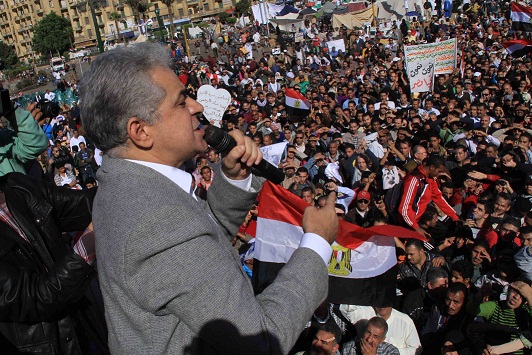
(AFP Photo)
By Dahlia Ali
Egypt’s request for more aid from the European Union came in tandem with a report issued by European auditors denouncing the union’s “softly softly” approach to providing the cash-strapped country with $1bn in aid over the past five years.
According to state-run news agency MENA, Minister of Planning and International Cooperation Amr Darrag discussed a €200m grant to support Egypt’s public budget (currently running a 10.6% of GDP deficit) with EU delegation head James Moran on Tuesday. The Egyptian government also requested a €500m soft loan which the country is currently reviewing the terms and necessary reforms required to secure, MENA reported.
Darrag and Moran also discussed other financial agreements including aid worth $150m that will be directed to the country’s educational system, solid waste treatment, labour-intensive development projects, and drinking water, health and sanitation services.
In the meantime, the European Court of Audits (ECA) issued a report calling on the EU to adopt a different approach towards Egypt. “The ‘softly softly’ approach has not worked and the time has come for a more focused approach which will produce more meaningful results and guarantee better value for the European taxpayers’ money,” stated Karel Pinxten, an ECA member responsible for the report.
According to a press release on Tuesday, the ECA and the European External Action Service (EEAS) had failed to ensure that the Egyptian authorities amended major shortcomings in the Public Finance Management (PFM) through which a €1bn worth of aid presented to Egypt from 2007 onwards has passed. The report cited lack of budgetary transparency, an ineffective audit function and endemic corruption as a number of the weaknesses not addressed by the Egyptian government.
“The [ECA] and EEAS did not react to the lack of progress by taking decisive action to ensure the accountability for considerable EU funds, which continued to be paid directly to the Egyptian authorities,” the statement said.
Political unrest and persistent labour strikes have slowed Egypt’s annual growth to 2.2%, while talks with the International Monetary Fund to reach an agreement for a $4.8bn loan have lagged as the government failed to present an economic reform programme involving higher taxes and rationing subsidies.
In the report, entitled EU Cooperation with Egypt in the Field of Governance, the ECA described the aid as “well-intentional but ineffective,” adding that the core focus of the EU aid did not improve. There was little or no progress on human rights, women’s rights had worsened since 2011, and very little was done through the EU to address corruption. Egypt’s official news service had reported that between 1996 and 2013, the EU had offered Egypt about €2.296bn in aid.




